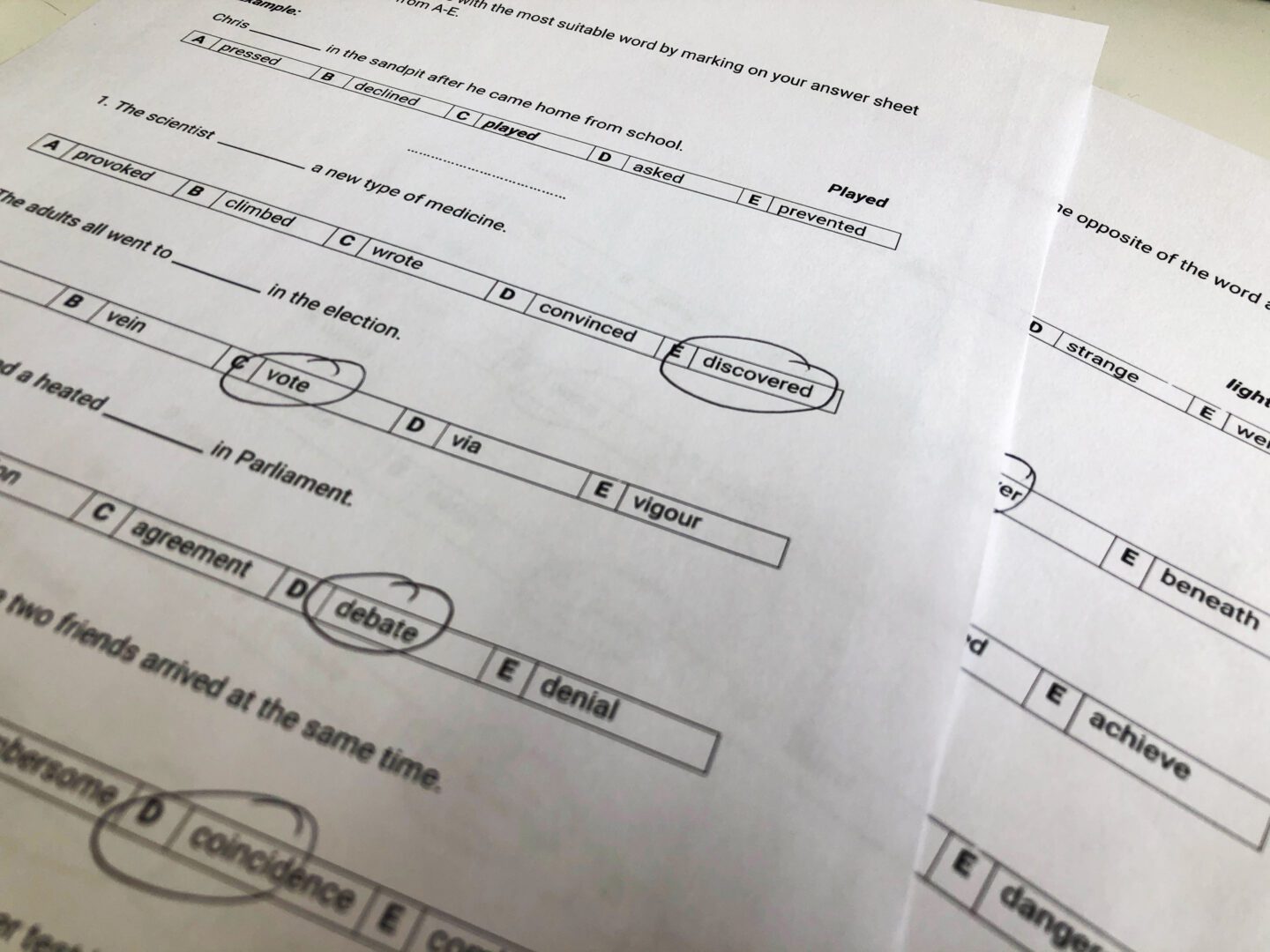
7 Plus
We're here to help you and your child navigate the admissions process from start to finish.
7 Plus Exam
We don’t believe the 7 plus exam should be a daunting prospect for your child. Our experienced 7 plus tutors will develop the skills they need in a relaxed, enjoyable way.
What is the 7 plus?
The 7 Plus exam is part of a process of admissions for children to enter competitive Prep schools, often from a different Pre-Prep or state primary school. Children sit the exam in the January of Year 2. It is usually the first significant academic test a child takes, hence many consider hiring a 7 plus tutor. Although this seems early to sit formal exams, parents often choose this entry point hoping to avoid the stress of 11 Plus entry. The admissions process will also include a reference from the child’s current school and usually an interview with the Head.

The child’s academic performance in the exam is usually the deciding factor in determining whether they are offered a place, particularly for more academic schools. However, all schools are looking for children that they would like to teach. They want children to be happy and thrive in their school environment, who will make the most of the opportunities afforded to them.
What is on the 7 Plus exam?
Unlike the 11 plus, where schools often use an external exam board, Prep schools usually set their own 7 Plus exam. The exam traditionally consists of a Mathematics Paper and an English paper, each of around 45 minutes. However, we are seeing more and more schools adding an element of Reasoning to their 7 Plus exams. This is intended to identify academic potential, rather than selecting children who have simply rote learned extra work. 7 Plus tutors usually cover all academic disciplines tested in the exam.
What is on the 7 Plus Maths Paper?
The 7 Plus maths paper correlates quite closely with the Year 2 National Curriculum Maths Syllabus. However, because the exam is sat halfway through Year 2, your child must learn the remainder of the Year 2 Maths topics before they are taught them in class. For the most competitive schools, 7 Plus questions will include topics from Year 3 and beyond. The majority of the paper involves mental arithmetic and tests the four operations. Additionally, it will typically include mathematical puzzles and wordy maths problems to unpick and solve. As a rule of thumb, ensure your child has covered the following topics confidently:
- The concepts of addition, subtraction, multiplication and ‘sharing’/division and be able to apply these rules to solve word problems.
- The 2, 3, 4, 5 and 10 times tables.
- Have a basic understanding of shape, time and money.
- Interpret simple tables and charts.
A 7 Plus tutor can help with all these topics.
What is on the 7 Plus English paper?
7 Plus English papers tend to strongly focus on comprehension and creative writing. For this age group, comprehensions tend to require children to pick out relevant facts and answer questions in full sentences. Children need to be taught this technique and practice it. Pre-Preps may have started this work, but children at state primaries often need to learn this from scratch for their 7 Plus exam. We have specialist 7 Plus tutors who can help.
For the Creative Writing element of the 7 Plus exam, children are often shown a story prompt such as an image and asked to write a story based upon this. Marks are awarded for an appropriate and relevant story, with a beginning, middle and end, legible handwriting, and good use of age-appropriate grammar. Children are expected to write a story 1-2 pages long.
Reasoning
Verbal Reasoning
Verbal Reasoning is, for the 7+, considered a test of ‘potential’. For this reason, parents often worry that they cannot help their children improve their Verbal Reasoning scores. This is absolutely not the case! Although your child may have a natural affinity for the subject, there are a finite number of types of Verbal Reasoning questions. It is easy to practice and improve on them all in an age appropriate way and a 7 Plus tutor can help.
Verbal Reasoning tests a child’s understanding of the complexity and nuance of language. By far the best long-term preparation for Verbal Reasoning success is to create a daily reading habit with your child. Vocabulary acquisition is a slow process and cannot be crammed into a few months at the end of Year 2.

Non-Verbal Reasoning
Non-Verbal Reasoning is also considered a test of ‘potential’ and is connected to numeracy, testing children’s understanding of number patterns and spatial awareness. As with Verbal Reasoning, each child will have a natural affinity for this topic but can certainly improve. Your child should practice all iterations of the test, with you or a 7 Plus tutor.
Beyond formal practice questions, all the following will develop your child’s understanding of 3D shapes and number patterns:
- Building with Lego, completing jigsaw puzzles or trying to solve the Rubik’s cube are all excellent ways to develop spatial awareness.
- Sudokus, riddles and word puzzles can all enhance problem solving abilities. Strategic games such as chess and draughts are brilliant for decision-making and thinking ahead.
- Learning to pay attention to colours, directions, sizes, angles or the lines of puzzles. This might help your child notice a pattern, connection or dissimilarity.
Promoting a positive and playful approach will help achieve stress-free success.
Educational maturity
A major factor in deciding whether to enter your child for the 7+ is their educational maturity at the end of Year 1 and over the summer before Year 2. Applications tend to open in the September of Year 2 and simply put, many children will not be ready to take formal exams a few months later. Look for signs that your child is academically ready so this won’t be too much of a stretch for them. This is particularly important as it is difficult to train small children intensively. The work for the 7 plus exam needs to be achieved in small, gentle increments. As an absolute minimum your child should have:
- Clear legible handwriting
- The ability to write quickly enough to fill a page with writing in 20 minutes or so
- Good knowledge of 2,3,4,5 and 10 times tables
- Good recall of number bonds
- Minimal anxiety around tests and testing
- They would be confident and happy to chat to the Head in an interview about their favourite book or their family.
Summer-born children
There can be an enormous difference in emotional and educational maturity between a September born child and an August one, after all they are a whole year older. Schools recognise this and want to offer places to children who are born throughout the year. Most schools therefore weight the results of the exams to balance up younger children’s results against those of older children.
However, we believe there is more of a problem with emotional maturity when it comes to summer-born children being ready to sit the 7+ exam. They are often, in our experience just not ready for an event so out of their comfort zone. They may not have the concentration or focus for the extra academic work required to pass. Also, their motor skills may be less developed and therefore they may not be able to write fast enough. If you feel this is the case for your summer-born child, you can always opt for the 8+, 9+ or wait for the 11+ if you feel they will be more ready by this age.
Tutoring for the 7 Plus
Given the competitive nature of the 7 Plus, particularly for London day schools, and the fact that the exams itself pull in the syllabus from Years 2 and 3 that few children will be taught in time, there is a need for someone to prepare your child for the 7 plus exam. This may be your child’s current school, you as parents and/or a 7 Plus tutor.

Tuition at such a young age is always a contentious topic and we understand that parents may baulk at imposing such pressure on their six year olds. Our advice is to be realistic about what you as parents can achieve consistently week in week out and make sure that at least some family time remains for relaxation and fun. However you decide to prepare, lessons should be light-hearted and fun and in gentle increments.
Our 7 plus tutors
Our specialist team of 7 plus tutors have invaluable insight into the admissions process at various independent schools. Many are senior teachers and heads of department from some of London’s leading schools. They are all qualified primary school teachers with an awareness of the emotional and educational needs of younger children when preparing for their 7+ exam.
The engaging tuition sessions are designed to instil a sense of self-confidence in your child. Our tutors equip children with the knowledge and level of focus needed to prepare them for the 7+. Our tutors use a variety of fun methods to develop your child’s core literacy and numeracy skills required for each specific school’s entrance exams and interview.
All our tutors come with a great deal of experience in school entrance, are reference checked and have up-to-date DBS certificates. Wherever possible, we will match you with a tutor who has taught at the school that your child is applying to.
“It was proving impossible for our daughter to focus on extra work at home with us and we were recommended to contact Mentor. They were very understanding and matched us with Nicky. The lessons were stimulating, fun and relaxed. Our once-reluctant daughter actually started to look forward to them. The extra support with Maths and English has helped her immeasurably and she has significantly grown in confidence. Fortunately, she gained a place.”
— Parent of a Mentor 7 plus tutee
Get in Touch
Contact us for expert advice about 7+ tuition, Academic Assessments and the next steps for your child.
-
Give us a call
020 8883 2519 -
Email us
hello@mentoreducation.co.uk -


